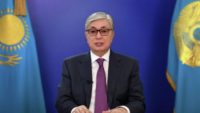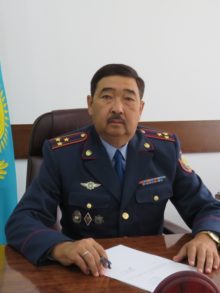We are glad to welcome you on the website of the Aktobe Law Institute of the Ministry of Internal Affairs of the Republic of Kazakhstan named after M. Bukenbaev.
Our educational institution trains personnel for the internal affairs bodies of the Republic of Kazakhstan – district police inspectors, district inspectors of the juvenile police, inspectors of the road patrol and migration police, criminal police officers, investigation and inquiry.
We are also working to clarify the law among the citizens of the country, to prevent and prevent the commission of illegal actions. Since Kazakhstan proclaims itself a legal state, every citizen of the republic should know their rights and obligations, strictly observe them in everyday life, showing intolerance to any kind of offenses, be able to protect their legitimate rights and interests.
Particular attention is paid to the promotion of legal knowledge among minors. It is very important for us that every child knows his rights and skillfully applies legal knowledge, while at school and at home, visiting various institutions and organizations, in public places (on the streets, in parks, entertainment centers), etc.
Opening the page of the Aktobe law institute of the Ministry of Internal Affairs of the Republic of Kazakhstan named after M. Bukenbaev “Legal Clinic”, we suggest that minors and their parents get acquainted with the basic norms of the constitutional, civil, family, administrative and criminal law of the Republic of Kazakhstan, and actively ask questions for which qualified answers will be given. Because it is not only interesting to know, but, we hope that it will provide legal assistance in the daily life of citizens.
To begin with, we recall that every human being is a child before reaching the age of 18 years.
The child has the right:
- The right to live. The right to a name.
- The right to citizenship.
- Absence of discrimination.
- The right to freedom of conscience and religious belief.
- The right to live with parents.
- The right to work.
- The right to rest.
- The right to protect life and health.
- The right to education.
- The right to be free of slavery.
- The right to housing.
- The right to freedom of speech.
- The right to receive information.
- The right to enjoy the achievements of culture.
- The right to create a family.
- The right to participate in scientific and technical, artistic creativity.
Having been born, the child acquires the right to citizenship, has the legal capacity under civil law, has the right to live and be educated in the family, to know his parents, to receive from them the protection of his rights and legitimate interests. A bank account can be opened in the name of the child.
A one-and-a-half-year-old has the right to visit a nursery school.
A three-year-old has the right to attend a kindergarten.
A six-year-old citizen has the right:
- attend school;
- have the right to enter into small household transactions independently.
A ten-year-old citizen:
- agrees to change his name and (or) surname;
- gives consent to his adoption or transfer to a foster family, or the restoration of the parental rights of his parents;
- Expresses his opinion about which of his parents, after the divorce, he would like to live with;
- be entitled to be heard in any judicial or administrative proceedings;
- can join children’s public associations.
Fourteen-year-old citizen:
- gives written consent for withdrawal from the citizenship of Kazakhstan together with parents;
- can choose the place of residence (with the consent of the parents);
- the right to enter into any transactions with the consent of the parents;
- the right to independently dispose of their income, salary, scholarship;
- exercise their copyright as a result of their intellectual activity;
- make deposits and dispose of them in credit institutions;
- has the right to obtain a passport;
- may be allowed to marry as an exception in the light of special circumstances (with full legal capacity);
- admission to work with the consent of the parents (for light work not more than 4 hours per day);
- has the right to demand the cancellation of adoption;
- can be trained in driving a motorcycle;
- has the right to drive a bicycle while driving on roads;
- is subject to criminal liability for certain crimes;
- shall be liable for property liability for the concluded transactions, as well as for the caused property damage;
- may be expelled from school for violations.
A fifteen-year-old citizen has the right to work (24 hours a week).
A sixteen-year-old citizen has the right:
- to marry if there are good reasons;
- control the moped while driving on roads;
- learn to drive a car on the road in the presence of an instructor;
- conclude an employment contract (contract), the working week must not exceed 36 hours;
- is subject to administrative and criminal liability for offenses.
A seventeen-year-old citizen is subject to initial registration for military registration (a certificate of registration is issued).
At the age of 18, the full capacity of the citizen comes. Acquires any rights and imposes any responsibilities.











